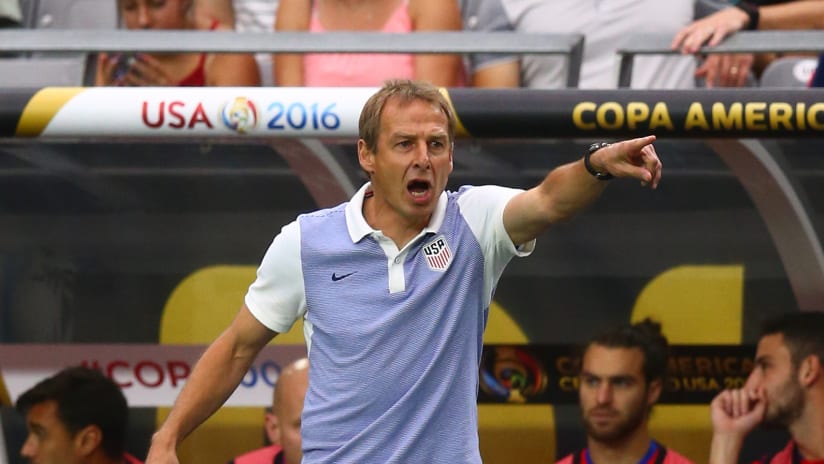The US played better in Saturday's third-place game, which first presented and then crystalized as a 1-0 loss to Colombia, than they did in the tournament-opening 2-0 loss. And they certainly played better than in the 4-0 semifinal humiliation at the feet of Argentina, which was the most comprehensive beat-down I've ever seen the US take in an official competition.
In between there were three other games: A 4-0 demolition of Costa Rica; a 1-0 win over Paraguay; and an engaging, hard-fought and gratifying 2-1 win over a very good Ecuador team. By any measure, I really do think that this was the finest month of Jurgen Klinsmann's nearly five-year tenure -- memories of last summer's failure at the Gold Cup, and the subsequent 3-2 loss to Mexico in the CONCACAF Cup are long gone for most fans.
The US squad, which played a flat 4-4-2 against Colombia in this one, no longer seems like it's on the verge of collapsing in upon itself as they did last summer, and as they did in March at Guatemala in a World Cup qualifier. At the same time, however, this tournament only reaffirmed the gap between the US and the world's best teams, rather than going any distance toward closing it.
To that point: Under Klinsmann the US are now 0-5-1 in official competitions (non-friendlies) against teams ranked in the top 10 of the Elo Ratings. Under the previous three coaches combined, the US were 5-15-2, including wins over the likes of Argentina, Brazil, Germany, Spain and Portugal.
Given the sample sizes, this could be just a run of bad luck. But I don't think it is, and the underlying numbers explain why:
- Steve Sampson’s teams played 450 minutes vs. teams in the Elo top 10, held the lead for 21.1% of the time
- Bruce Arena’s teams played 810 minutes vs. teams in the Elo top 10, held the led for 22.2% of the time
- Bob Bradley’s teams played 720 minutes vs. teams in the Elo top 10, held the lead for 25.5% of the time
- Jurgen Klinsmann’s teams have played 570 mins vs. teams in the Elo top 10, and have held the lead for 1.6% of the time
That translates to holding the lead for nine minutes of action, which came from minutes 81-90 in the World Cup group stage against Portugal. Since that game -- which ended in a 2-2 draw -- the US have scored one goal (Julian Green's volley) in 480 minutes of action against Elo top 10 squads.
So it's not just that they're getting beat, it's that they're not as competitive as they used to be.
It extends out past the Elo top 10 to the Elo top 20 as well. Sampson took nine of the 33 points available to his team against top 20 squads in official competitions; Arena 17 of 45; Bradley 10 of 36. Klinsmann is now at 8 out of 30 points, which is the lowest percentage of the group despite fully 60% of his team's games against Elo top 20 squads coming at home -- most out of any coach in modern US history.
The good news? Six of Klinsmann's eight points vs. top 20 teams came in this tournament when they smashed Costa Rica (ranked 20th at the time, now 33rd), and then the win over Ecuador (14th, now 15th). By any measure, those were good wins. Performances and results like what the US got in those two games will be enough to get them into the 2018 World Cup.
But it's fair to question whether the US have gained any ground against Klinsmann's stated goal: Making the group compete "eye to eye" with the world's elite.
Under each of the previous three coaches, doing so was a regular occurrence. For the current regime, it seems only like a talking point.













